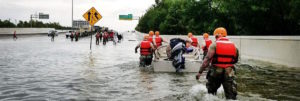Offshore and Maritime Diving Accident
The Risks of Maritime Diving Accidents
Without question, diving is a dangerous activity. Whether for pleasure or for work, diving beneath the beautiful blues of any depth of water can involve risk. Since humans do not breathe water, we have to breathe air while under water, which can create dangerous drowning, respiratory or circulatory risks.
Working while diving is particularly risky because of the added pressure of the duty of the job and the equipment being used while on the dive. Divers working in the construction industry, the oil and gas industry, on a search and rescue team or in the scientific world may become injured or die at the hands of negligent co-workers or because of faulty diving equipment, a welding instrument or piece of heavy equipment.
The art of managing a breathing apparatus and work equipment while under water is a skill that will likely receive higher compensation than most other jobs, but the risk is particularly high when the company you work for is not OSHA compliant. Occupational safety regulations are required by federal law. If there are no safe systems of work in place, no amount of skill will protect a diver several hundred feet under the ocean.
Maritime Law and The Jones Act
Maritime law governs issues and accidents that occur at sea. The Supreme Court of the United States stated that “Seamen are the ‘wards of admiralty,’ whose rights federal courts are duty bound to zealously protect.” Garrett v. Moore-McCormack, Co., 317 U.S. 239 (1942).
Covered workers generally include seamen and employees injured while working on or on behalf of a vessel, employees working on oil and gas platform rigs not permanently affixed to the ocean floor and employee divers.
When filing a lawsuit, workers typically make a general maritime claim as well as a claim under The Jones Act. The Jones Act is one of the most widely applied statutes under the maritime umbrella. It is a federal statute that covers employees of shipping vessels when they are injured on U.S. waterways and between ports because of the negligence of another; primarily, ship owners, shipmates and ship captains.
The statute confers jurisdiction to federal district courts for claims for injuries sustained by ship or vessel workers traveling on oceans and intra-coastal waterways. A lawsuit under this act would be held in the jurisdiction of the employer’s business.
If you or a loved one was injured while diving, it is time to make a call to a competent attorney to see if you have a case so you may be compensated properly for losses sustained at the hands of another’s negligence.
Since 2006, Chad Pinkerton has recovered over $200 million* on behalf of victims of maritime and industrial accidents.
Statute of Limitations and Money Damages
The statute of limitations for this Act is three years from the date of injury.
Regarding awards of money damages, a lawsuit under The Jones Act will attribute fault to each party, including the plaintiff, as applicable, and will apply damages based on how fault is distributed. Under this act, workers are entitled to maintenance and cure monies, which cover costs involved in the event of an employee’s illness.
Financial recovery can include present and future medical bills. Other potential areas of compensation, depending on the facts of the situation, are mental pain and suffering damages, lost wages, loss of consortium, maintenance and cure, permanent impairment/disfigurement, punitive damages, loss of enjoyment of life and wrongful death damages.










